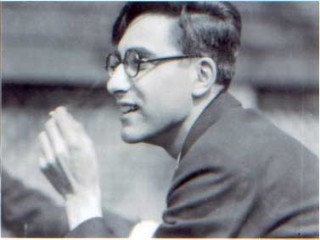
Louis Zukofsky biography
Date of birth : 1904-01-23
Date of death : 1978-05-12
Birthplace : New York City, New York, US
Nationality : American
Category : Famous Figures
Last modified : 2011-05-05
Credited as : Poet, 55 Poems , Objectivist poetry movement
0 votes so far
Zukofsky began writing poetry at university and joined the college literary society, as well as publishing poems in student magazines like The Morningside (now Columbia Review). One early poem was published in Poetry but never reprinted by Zukofsky. He considered Ezra Pound the most important living poet of his youth. In 1927, he sent his poem Poem beginning "The" to him. Addressed mostly to the poet's mother, the poem was in part a parody of T. S. Eliot's The Waste Land. In contrast to Eliot's pessimistic view of the modern world, The suggests a bright future for Western culture, based in Zukofsky's belief in the energy the new immigrants brought to the United States and in the October Revolution.
Pound was impressed by the poem and published it a year later in the journal Exile. Zukofsky further impressed Pound by writing the first analyses of Pound’s Cantos in 1929, when they were still unfinished. Pound then persuaded Harriet Monroe, Chicago heiress and founder of Poetry, to allow Zukofsky to edit a special issue for her in February of 1931.
In 1934, Zukofsky got a research job with the Works Projects Administration (WPA), a position he held until 1942, working on a history of American handicrafts. In 1933, he met Celia Thaew who he married six years later. The Zukofskys had one child, Paul (born in 1943), who went on to become a prominent violinist and conductor. In 1943, Zukofsky left the WPA to work as a substitute public school teacher and a technical writer. In 1947, he took a job as an instructor in the English Department of the Polytechnic Institute of Brooklyn, where he taught until his retirement in 1966.
In 1972, the Zukofskys moved to Port Jefferson, on Long Island. When Zukofsky died there on May 12, 1978 he had published 49 books, including poetry, short fiction, and critical essays. He had won National Endowment for the Arts Grants in 1967 and 1968, the National Institute of Arts and Letters Grants in 1976, and an honorary doctorate from Bard College in 1977.
The difficulty of Zukofsky's later poetry alienated many critics and even some of his former friends. Zukofsky quarrelled bitterly with George Oppen after Oppen accused Zukofsky of using obscurity as a tactic. But the 1960s and 1970s also brought Zukofsky a degree of public recognition that he had never before received. The influential scholar Hugh Kenner became a close friend of Zukofsky and an advocate of his work. Such major poets as Robert Duncan and Robert Creeley testified to Zukofsky's importance as the creator of daring experimental writing.
Author of books:
55 Poems (1941, poetry)
Bottom: On Shakespeare (1963)
All: The Collected Short Poems, 1923-1958 (1965, poetry)
All: The Collected Short Poems, 1956-1964 (1966, poetry)
Little: A Fragment for Careenagers (1967, novella)
Ferdinand (1968, novel)
Prepositions: The Collected Critical Essays of Louis Zukofsky (1968, essays)
Wrote plays:
Arise, Arise (1962)

















